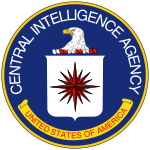CIA director
| Director of the Central Intelligence Agency | |
|---|---|

Seal of the CIA
|
|

Flag of the CIA
|
|
| Central Intelligence Agency | |
| Reports to |
President Director of National Intelligence |
| Seat | George Bush Center for Intelligence, Langley, Fairfax County, Virginia, U.S. |
| Appointer | President |
| Term length | No fixed term |
| Constituting instrument | 50 U.S.C. § 3036 |
| Precursor | Director of Central Intelligence |
| Inaugural holder | Porter J. Goss |
| Formation | April 21, 2005 |
| Deputy | Deputy Director of the CIA |
| Salary | Executive Schedule, II |
| Website | www |
The Director of the Central Intelligence Agency (D/CIA) is a statutory office (50 U.S.C. § 3036) which functions as the head of the Central Intelligence Agency, which in turn is a part of the United States Intelligence Community. Since February 2017, the D/CIA has been a cabinet-level position.
The Director reports to the Director of National Intelligence (DNI) and is assisted by the Deputy Director of the Central Intelligence Agency. The Director is a civilian or a general/flag officer of the armed forces nominated by the President, with the concurring or nonconcurring recommendation from the DNI, and must be confirmed by a majority vote of the Senate.
Before April 21, 2005, the Director of Central Intelligence (DCI) headed both the Intelligence Community and the Central Intelligence Agency. In addition, DCI served as an advisor to the President of the United States on intelligence matters and was the statutory intelligence advisor to the National Security Council (NSC). On April 21, 2005, the Director of National Intelligence (DNI) took on the roles as head of the Intelligence Community and principal intelligence advisor to the President and the NSC.
The post of DCI was established in 1946 by President Harry S. Truman; it thus predates the establishment of the Central Intelligence Agency (created by the National Security Act of 1947). After the end of World War II, the Office of Strategic Services was dismantled and its functions were split between the Departments of State and War (now Defense). President Truman soon recognized the inefficiency of this arrangement and created the Central Intelligence Group, which could be considered a smaller precursor to the National Security Council. The following year the National Security Act of 1947 created the Central Intelligence Agency and National Security Council, while formally defining the duties of the Director of Central Intelligence. The duties of the DCI had been further defined over the years by tradition, congressional acts, and Executive Orders.
...
Wikipedia

